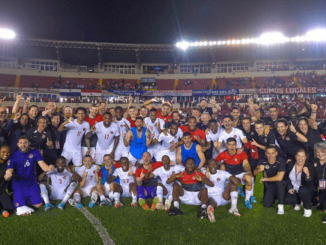In this 3 part series of articles, we take a look at the history of soccer in Canada, who to watch at the 2022 World Cup, and what to expect from Team Canada, in Qatar, and also in future World Cups.
The last time Canada’s men’s national soccer team qualified for a world cup, Brian Mulroney was prime minister, Chernobyl had just had a meltdown, and the original top gun was in theaters. How did we get here?

The year was 1986, and frankly, at the time I was 5 years old. I have zero recollection of Canada’s last World Cup appearance, and after researching a bit – maybe it’s for the best.
The 1986 World Cup was hosted in Mexico, which meant that as hosts, Mexico (the highest ranked team in North America) would qualify automatically, leaving an ‘extra’ spot in the World Cup for CONCACAF (Confederation of North, Central America and Caribbean Association Football) teams.
Canada, in order to get to this point of qualification in 1986, had to rely on Jamaica withdrawing from the competition, and forfeiting their deciding qualification game to Canada. At the time Jamaica was actually starting to become quite good and, by 1998, had built a side, that would qualify for the World Cup, to go along with two finals appearances in the Gold Cup (The North American International Cup).
A huge loss by the United States to Costa Rica, on the other side of the final qualification bracket in ’86, meant that Canada had successfully avoided both the USA and Mexico, the two top-ranked teams in the region. This meant that Canada’s chances for qualification in 1986 had improved drastically before they even had to play a competitive game. To their credit, they managed to stay undefeated in the final round of qualification and made it to their first and only World Cup, however, the odds were truly stacked in their favour.
THE 2022 QATAR QUALIFICATION RUN:
HOW DID CANADA END UP WINNING THE GROUP WHEN THEY WERE THE 2ND LOWEST RANKED TEAM IN THE FIELD?
For the 2022 World Cup, Canada had no help, and in fact, the odds were stacked against us. This makes the accomplishments of this current 2022 Canadian Soccer squad, that much more incredible. Some could argue, that this is actually the first time Canada has truly qualified for a World Cup, without any help from exterior forces. Not only is the 2022 competition being hosted in Qatar (which left both Mexico and the USA in the CONCACAF qualification rounds) but Canada was forced to play two extra rounds to qualify – as their international ranking at the time was only 73rd in the world.
Canada went on to score a goal differential of 27-1 in the first round, absolutely destroying the competition, including an 11-0 drubbing of the Cayman Islands, and a 7-goal showing over Aruba. It was clear Canada had no business playing in this group, and hopefully will never have to again!
The next phase was not going to be as easy. Canada was put into a playoff with some pretty good teams. El Salvador, Panama, and Haiti were the most notable teams in the pool – and Canada was slated to play Haiti in a 2 game series in order to move on, lose and you go home (the same games that Jamaica forfeited in 1986). Canada won 4-0 on aggregate to make it into the final group.
After watching how the Qualifiers unfolded, it is almost laughable to look back at the final group, and see that Canada had the 2nd worst overall FIFA ranking, prior to the start of qualifying, out of the entire group: Mexico (11), United States (22), Costa Rica (46), Jamaica (48), Honduras (62), El Salvador (69), Canada (73), and Panama (81).
Only the top three teams would automatically qualify for the World Cup, with the 4th team being sent as the CONCACAF representative – for the “Inter-Continental Playoff”.
Understand, that for the most part, historically, the CONCACAF inter-continental playoff is just a formality. Usually, the North American team that finishes 4th, will have to go up against the 5th place finisher in South America… Needless to say, there are more than 4 world-class teams in South America, so most CONCACAF teams want to avoid this at all costs, and Canada is no exception.
For instance this year Peru(22) is the representative from South America, and Costa Rica(31) is the representative from North America for the playoff games – and these rankings are only this close – due to upsets in both divisions.
The teams eliminated in CONMEBOL include Colombia(10), and Chile(17), both of which have higher international rankings than Canada(38) or Peru does currently. If Canada hadn’t had such a strong showing during qualifying and finished in that 4th spot, our ranking would probably be closer to the rank of 73rd in the world that we started at, during qualifications. Canada’s current ranking of 38th in the world is the highest mover of any country this year according to FIFA’s official website!
Canada ended up winning the entire group, finishing with a record of 8 wins, 4 draws, and only 2 losses. Remarkably notching wins vs Mexico, USA, Costa Rica, and Panama.
The final standings made it look closer than it really was, with Costa Rica only finishing 3 points behind Canada for the 4th spot, and sent to the dreaded playoff vs South America. Canada jumped out to such a big lead early on in the group, that the rest of the competition was playing catch up for the entire competition.
After an incredible performance in qualifying, and not receiving any byes (like the top 5 ranking nations in CONCACAF did), Canada managed to qualify against all odds for the World Cup in Qatar 2022, improving their ranking tremendously (Canada was ranked 122nd in the world in 2018). Next time around, if we can maintain a ranking higher than Costa Rica, Jamaica, Honduras, and Guatemala, we will earn a bye, and go directly to the last round of qualifying for the next World Cup!
MORE CANADIAN KIDS PLAY ORGANIZED SOCCER THAN HOCKEY, AND IT HAS BEEN THIS WAY SINCE THE 1980s. WHY HAS IT TAKEN SO LONG FOR CANADA TO SEE THE EFFECT OF THIS ON THE INTERNATIONAL SOCCER SCENE?
As a Canadian – I played organized soccer as a kid. It seems like we all did. Statistically, we see from a recent article in Macleans Magazine that Soccer is by far the most practiced and played sport in Canada among children. More Canadian kids play organized soccer than hockey, and frankly, it is not even close (42% – Soccer vs 22% Hockey). However, when we look to the professional sphere, Canada produces some of the best Hockey players in the world and very few soccer players. Why are our kids losing interest in soccer and gravitating to other sports?
Historically the Canadian National soccer program was so bad, that our top pro in the early 2000s, Owen Hargreaves, decided to not waste his time playing for a side that had no chance of competing. Instead, he made 42 appearances on England’s National Team. He was a household name in Europe, playing for Bayern Munich, and Manchester United, and was born and raised in Calgary, Alberta. He played his first 3 years of youth soccer with the Calgary Foothills FC, before moving to Bayern Munich’s youth squad in 1997. Sadly many Canadians have no idea who one of our greatest footballers is, there was very little coverage of soccer in Canada back then.
This, I believe, is the root of the issue, and can help answer the question above. First of all, soccer is just not that popular in the mainstream media in North America. As a kid I didn’t know who Maradona or Pele was, but I definitely wanted Michael Jordan’s shoes. My friend’s dad, who was from England, would watch “Soccer Saturday”, while me and his son played video games, in the next room. In other words, we didn’t care. There was zero media back then covering soccer. On the playground, we wore our hats like Ken Griffey Jr during the home run derby. We’d practice spin moves pretending to be Barry Sanders, and some of us were willing to entertain the thought of one day, having Wendel Clark’s babies…
We all played soccer, even organized soccer, but when it came to the schoolyard, our imaginations were more infatuated with replicating George Bell’s batting stance, Al Iafrate’s slap shot, and Michael Jordan’s fadeaway… than trying to learn Roberto Carlos’ free-kick techniques! And let’s be honest, imagination is the first step to becoming a pro athlete.
I had the chance to live in Europe for a few years, and I can tell you firsthand, that the mainstream media’s interest in a certain sport, creates an environment where you can follow that sport, and care about it. I can relate it to Canada – specifically Calgary – and the city’s total and complete, dedication to the Flames. I grew up in Toronto, went to University out in Calgary, and I can tell you, no one in Canada supports their hockey team the way Calgary supports its Flames.
Living in Calgary you cannot avoid the Flames. Talking about the Flames in Calgary is the equivalent of asking how the weather is. This shows, that your environment and what media you are exposed to, truly dictates what you care about, especially sports-wise.
And so we finally arrive at the meat of the issue, Canada, unfortunately, is at a disadvantage when it comes to the media’s portrayal of soccer:
First of all, we are not part of the top-tier competition in the world. MLS, and its generational predecessors, unfortunately, have never been considered top-tier leagues on the world scale. North American soccer is mostly notable for signing old players at the end of their careers, like Pele, Ibrahimovic, Beckham, and Rooney. In fact, some soccer purists discredit some of Pele’s achievements because he played in North America and not Europe.
The time difference to Europe also contributes to the fact that top-tier soccer, is not really shown live very often during prime time in North America, making it extremely hard to care about or follow.
With the competition of 4 other sports, with predominantly North American roots, soccer is still at a severe disadvantage when competing for our children’s imagination, and future.
CAN WE CHANGE THIS NARRATIVE? WILL TOP-TIER SOCCER EVER BE A THING IN NORTH AMERICA?
The rise in popularity of MLS soccer in Canada, in the last 10 years, has been well documented. Toronto FC, since its inaugural season in 2005, has steadily gained interest, and sells out its stadium regularly, with incredible fan support. Atlanta United FC regularly pulls in 50,000 fans for it’s home games, and is one of the most attended soccer games in North America. The support is there if the city builds the infrastructure, and the media hops on board. As encouraging as the success of MLS in recent years is, it will probably never be a top-tier league, as far as the world’s soccer scene goes.
However, as transportation technology advances and the world becomes smaller and smaller, connected by the Internet and Social Media, we could plausibly see a future where North American soccer clubs could compete in Europe and even the Champions League. Whether it would potentially be the integration of the MLS into a worldwide Champions League, or even clubs from North America competing in Europe. We would, of course, need the help of Maglev vacuum tube trains, that travel across the Atlantic Ocean in minutes!
The precedent for American teams competing in Europe is actually already there. The Toronto Wolfpack, a Rugby team from Toronto founded in 2016, actually played and competed in the British rugby league system. Not only did they play, they dominated. At first, the UK Rugby world thought it was a joke, a team from Canada? Please. Well, to everyone’s surprise, they won the entire league, getting promoted. Than they went on to get promoted again and were slated to play in the Top Rugby league in England – when they were forced to withdraw due to COVID and financial reasons.
In summary, maybe one day, in the distant future, we will see Premier League teams in North America or some version of it. I nominate Brampton as the first city in Canada to compete in the Premier League! You will understand why, after reading PART II: Who To Watch on Team Canada at the World Cup in Qatar 2022.


